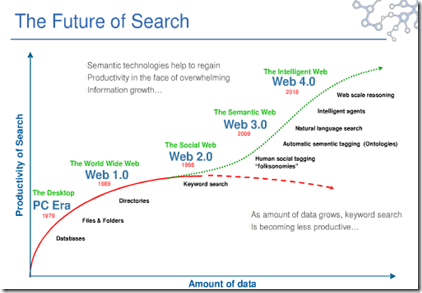The Future of Enterprise and Web Search: Worrying about a Very Frail Goose
May 28, 2015
For a moment, I thought search was undergoing a renascence. But I was wrong. I noted a chart which purports to illustrate that the future is not keyword search. You can find the illustration (for now) at this Twitter location. The idea is that keyword search is less and less effective as the volume of data goes up. I don’t want to be a spoil sport, but for certain queries key words and good old Boolean may be the only way to retrieve certain types of information. Don’t believe me. Log on to your organization’s network or to Google. Now look for the telephone number of a specific person whose name you know or a tire company located in a specific city with a specific name which you know. Would you prefer to browse a directory, a word cloud, a list of suggestions? I want to zing directly to the specific fact. Yep, key word search. The old reliable.
But the chart points out that the future is composed of three “webs”: The Social Web, the Semantic Web, and the Intelligent Web. The dates for the Intelligent Web appears to be 2018 (the diagram at which I am looking is fuzzy). We are now perched half way through 2015. In 30 months, the Intelligent Web will arrive with these characteristics:

- Web scale reasoning (Don’t we have Watson? Oh, right. I forgot.)
- Intelligent agents (Why not tap Connotate? Agents ready to roll.)
- Natural language search (Yep, talk to your phone How is that working out on a noisy subway train?)
- Semantics. (Embrace the OWL. Now.)
Now these benchmarks will arrive in the next 30 months, which implies a gradual emergence of Web 4.0.
The hitch in the git along, like most futuristic predictions about information access, is that reality behaves in some unpredictable ways. The assumption behind this graph is “Semantic technology help to regain productivity in the face of overwhelming information growth.”
The problem is that semantics are not going to be much help unless these types of content can be acquired, processed so that information access is more than an Easter egg hunt, and outputs are on point. You know. The information is not incomplete, incorrect, or filtered for the benefit of a company, a government, or a couple of people working quietly in Wuhan.
Here are the content challenges which neither buzzwords like semantics nor fantastical imaginings can address:
- Video and other rich media content. What is on those voicemails anyway?
- Dark Web content. I know, I know. What? Time to wake up and check out the digital space in which money and products are moving to and fro. What are employees doing anyway?
- Geolocation tagged intercept data. The notion of monitoring employees may be distasteful, but the idea may have some appeal for government contractors, pharmaceutical companies, and nervous FIFA administrators.
- Content scattered on various clouds due to the inattention of device users, the indifference of internal information technology staff, and the frisky person who thinks it is really funny to fire off images via social media. (Anthony, I do miss your posts and explanations.)
The hope embodied in this chart is that information access will become useful, reliable, usable, and meaningful.
I wish to point out that the future of search has been arriving for 40, maybe 50 years. I am not sure that the future of search is moving like Usain Bolt. When my father was recovering from a broken hip, he moved slowly. That’s the future of search, which seems to believe that the days of green fuses and decades of opportunity were ahead.
Search has been converted into a utility. Search will have to do some fancy flips to get back in the game. The future of search is not a list of jargon. Search has to deliver value, which has eluded hundreds of vendors and a legion of consultants.
The search goose no longer does the golden egg thing. The search goose is nearly dead, but some folks don’t know it.
Stephen E Arnold, May 28, 2015


